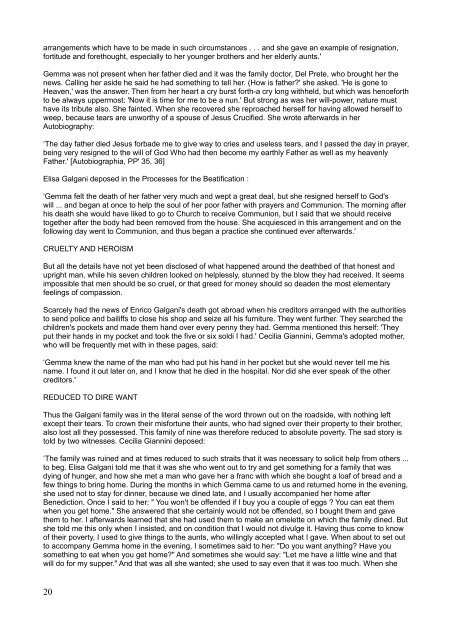BIOGRAPHY of ST GEMMA GALGANI - Get a Free Blog
BIOGRAPHY of ST GEMMA GALGANI - Get a Free Blog
BIOGRAPHY of ST GEMMA GALGANI - Get a Free Blog
You also want an ePaper? Increase the reach of your titles
YUMPU automatically turns print PDFs into web optimized ePapers that Google loves.
arrangements which have to be made in such circumstances . . . and she gave an example <strong>of</strong> resignation,<br />
fortitude and forethought, especially to her younger brothers and her elderly aunts.'<br />
Gemma was not present when her father died and it was the family doctor, Del Prete, who brought her the<br />
news. Calling her aside he said he had something to tell her. (How is father?' she asked. 'He is gone to<br />
Heaven,' was the answer. Then from her heart a cry burst forth-a cry long withheld, but which was henceforth<br />
to be always uppermost: 'Now it is time for me to be a nun.' But strong as was her will-power, nature must<br />
have its tribute also. She fainted. When she recovered she reproached herself for having allowed herself to<br />
weep, because tears are unworthy <strong>of</strong> a spouse <strong>of</strong> Jesus Crucified. She wrote afterwards in her<br />
Autobiography:<br />
‘The day father died Jesus forbade me to give way to cries and useless tears, and I passed the day in prayer,<br />
being very resigned to the will <strong>of</strong> God Who had then become my earthly Father as well as my heavenly<br />
Father.' [Autobiographia, PP' 35, 36]<br />
Elisa Galgani deposed in the Processes for the Beatification :<br />
‘Gemma felt the death <strong>of</strong> her father very much and wept a great deal, but she resigned herself to God's<br />
will ... and began at once to help the soul <strong>of</strong> her poor father with prayers and Communion. The morning after<br />
his death she would have liked to go to Church to receive Communion, but I said that we should receive<br />
together after the body had been removed from the house. She acquiesced in this arrangement and on the<br />
following day went to Communion, and thus began a practice she continued ever afterwards.'<br />
CRUELTY AND HEROISM<br />
But all the details have not yet been disclosed <strong>of</strong> what happened around the deathbed <strong>of</strong> that honest and<br />
upright man, while his seven children looked on helplessly, stunned by the blow they had received. It seems<br />
impossible that men should be so cruel, or that greed for money should so deaden the most elementary<br />
feelings <strong>of</strong> compassion.<br />
Scarcely had the news <strong>of</strong> Enrico Galgani's death got abroad when his creditors arranged with the authorities<br />
to send police and bailiffs to close his shop and seize all his furniture. They went further. They searched the<br />
children's pockets and made them hand over every penny they had. Gemma mentioned this herself: 'They<br />
put their hands in my pocket and took the five or six soldi I had.' Cecilia Giannini, Gemma's adopted mother,<br />
who will be frequently met with in these pages, said:<br />
‘Gemma knew the name <strong>of</strong> the man who had put his hand in her pocket but she would never tell me his<br />
name. I found it out later on, and I know that he died in the hospital. Nor did she ever speak <strong>of</strong> the other<br />
creditors.'<br />
REDUCED TO DIRE WANT<br />
Thus the Galgani family was in the literal sense <strong>of</strong> the word thrown out on the roadside, with nothing left<br />
except their tears. To crown their misfortune their aunts, who had signed over their property to their brother,<br />
also lost all they possessed. This family <strong>of</strong> nine was therefore reduced to absolute poverty. The sad story is<br />
told by two witnesses. Cecilia Giannini deposed:<br />
‘The family was ruined and at times reduced to such straits that it was necessary to solicit help from others ...<br />
to beg. Elisa Galgani told me that it was she who went out to try and get something for a family that was<br />
dying <strong>of</strong> hunger, and how she met a man who gave her a franc with which she bought a loaf <strong>of</strong> bread and a<br />
few things to bring home. During the months in which Gemma came to us and returned home in the evening,<br />
she used not to stay for dinner, because we dined late, and I usually accompanied her home after<br />
Benediction. Once I said to her: " You won't be <strong>of</strong>fended if I buy you a couple <strong>of</strong> eggs ? You can eat them<br />
when you get home." She answered that she certainly would not be <strong>of</strong>fended, so I bought them and gave<br />
them to her. I afterwards learned that she had used them to make an omelette on which the family dined. But<br />
she told me this only when I insisted, and on condition that I would not divulge it. Having thus come to know<br />
<strong>of</strong> their poverty, I used to give things to the aunts, who willingly accepted what I gave. When about to set out<br />
to accompany Gemma home in the evening, I sometimes said to her: "Do you want anything? Have you<br />
something to eat when you get home?" And sometimes she would say: "Let me have a little wine and that<br />
will do for my supper." And that was all she wanted; she used to say even that it was too much. When she<br />
20


